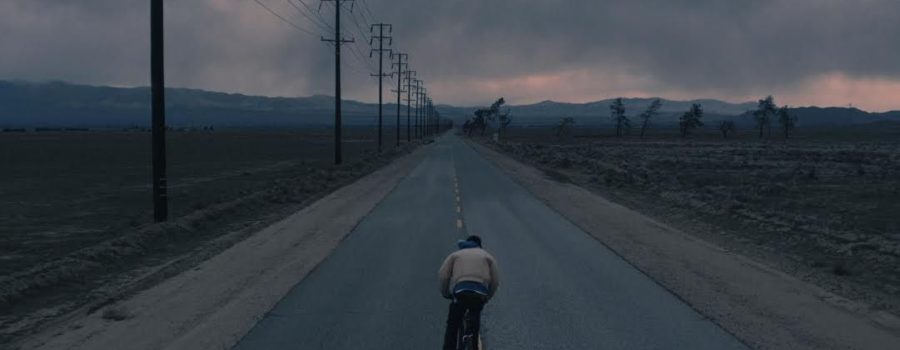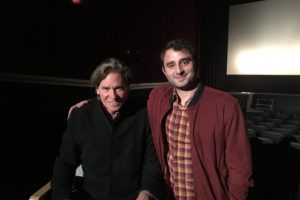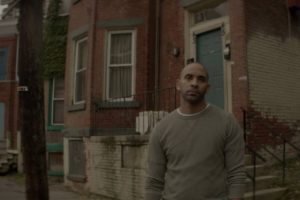 [Published at Awards Circuit] 2017 Berlin Critics’ Week: From director Mike Ott (“Actor Martinez,” “Lake Los Angeles”), “California Dreams,” a docu-comedy, is one of the first of its kind. It is wonderfully funny, bleak and depressing, blending fiction with reality; the film uses real people not trained actors. It stars Cory Zacharia and follows the lives of five people – Cory, Patrick, Neil, Kevin (A Dog the Bounty Hunter impersonator), and Carolan – as they audition to pursue their dreams of making it to the facade of Hollywood.
[Published at Awards Circuit] 2017 Berlin Critics’ Week: From director Mike Ott (“Actor Martinez,” “Lake Los Angeles”), “California Dreams,” a docu-comedy, is one of the first of its kind. It is wonderfully funny, bleak and depressing, blending fiction with reality; the film uses real people not trained actors. It stars Cory Zacharia and follows the lives of five people – Cory, Patrick, Neil, Kevin (A Dog the Bounty Hunter impersonator), and Carolan – as they audition to pursue their dreams of making it to the facade of Hollywood.
The film sets its tone immediately with a series of comical auditions, with a beautiful monologue about the main character, Cory’s, big dreams of moving to Finland, over beautiful shots of him riding his bike on an abandoned Lancaster, California highway. Throughout the film, his friend from Berlin, Henning, pressures him to move there to get acting opportunities, constantly reminding him to send his audition video to show the producers he can act. Yet, Cory does not have the money for the flight.
Cory Zacharia is a kind, loving and earnest spirit, who has spent the last eight years pursuing Hollywood. He is the central character who possesses a childlike sense of naivety, earnestness and infectious enthusiasm. Unemployed, Cory comically struggles to spell simple words like “experience” on his employment applications as his mom helps him find a job, all while battling depression and addiction; these real people all have demons, making them extremely relatable regardless of what their demons are.
Each intro to the characters begins with a monologue of their favorite films during an audition, a concept that Ott fleshed out when discussing aspiring actors’ favorite films. Cory’s monologue is taken from the character Johnny, Ralph Macchio’s part from “The Outsiders.” Patrick Llaguno, from Valencia, California, works at Six Flags. His monologue is from “Forrest Gump,” a movie that made him a cinephile at 7 or 8. Neil Harley, a screenwriter from Las Vegas, Nevada, did his monologue as Kumar from “Harold and Kumar Go to White Castle.” Neil provides wonderful narration, covering his screenwriting process, which is beautifully written. Kevin “K-Nine” Gilger’s audition is just him talking about his life as an impersonator. He is from Castaic, California, and runs a company called “All Locked Up.” Carolan J. Pinto from Van Nuys, California has “silly dreams” about her book becoming a best-seller. She’s lived out of her car for the last two years. She doesn’t have a monologue, but rather talks about a recurring dream she has every Oscar season of winning an Academy Award.
Long conversations between the struggling actors take place in Cory’s car, which provides humor of their past endeavors, struggles and dreams. The film is at its best when it covers these moments. Both striving for love, Cory and Patrick discuss humorous sexual (or non-sexual) experiences. Cory and Neil discuss Neil’s body image and how bigger clothes cost more. Dog’s conversation with Cory in his car is about how larger crowds and attention fuel his drive. Carolan’s conversation in Cory’s car is about the top 10 traits their ideal romantic partners would possess. Another humorous recurrence in the film is Kevin, in full “Dog mode,” who keeps mistaking Cory for the wrong person, arresting him.
Old Hollywood films being shown and songs such as “American Dreamer” by Andrea Litkei and “Play-In” by the Hilversum Philharmonic Orchestra harken back to a bygone era and provide a context of how Hollywood has changed for the worse. These are often contrasted with the depressing lives of these people and their hopeless dreams. Ott explained that often people want to be actors, but never put in the meticulous work that is required to achieve such an endeavor, only talk about their aspirations. Cory attends acting classes to fine tune his skills, and Neil writes, but most other characters only talk about their pursuits instead of taking action.
When Cory explains to him that he can’t get a job to find the money, his friend Henning puts him down, causing him to break down. This prompts director Ott to cut the scene as Cory has an emotional outburst. In this unprecedented scene in film history, all of what occurs onscreen is real. Cory’s breakdown was real, and Ott’s yelling of cut was incorporated in the film. The viewer often forgets they are watching something that is, for the most part, real.
In a moment of comedic, seemingly divine intervention, Cory finds a trail of money, prompting a wonderful sequence to another wonderful old Hollywood-esque score. This is one of the only moments of fictionalized sensationalism in the film. Now, Cory can help pay his mother’s rent and go to Germany to finally pursue his dreams. Will his quest to Germany lead to self-actualization? The audience never knows, but the film ends on an uplifting note – Cory is finally able to leave his small town for bigger aspirations. On the taxi to the airport, the driver says to him, “You’re like Rocky, you’ve got these impossible odds, you’ve got people telling you it can’t be done I’m sure, you’ve got demons that you have to deal with…you are your own Rocky, man.” Aren’t we all?
One of Cory’s last thoughts in the narration says, “I am 27, already wishing to go to heaven…one day I will escape to that beautiful Finnish landscape.” Though these people want to be an industry founded on escapism to ease the collective conscience of America on the cusp of war, what they really want is a better life, something that is not a promise if one is lucky enough to find success as an actor.
With “California Dreams,” director Mike Ott took inspiration from “Close-Up,” an acclaimed film by Iranian director Abbas Kiarostami which also focused on the lives of real people. The film was shot over two-and-a-half years, and is a somber yet funny ode to Hollywood, as well as a biting critique on both the boundaries of the film industry and the over-importance people place on being an actor; these characters all think that acting will suddenly make their lives better, but it is an unrealistic expectation to have. A Cal Arts alumnus, Ott is currently developing his next script, which will cover the conspiracies surrounding the life and actions of domestic terrorist Timothy McVeigh.
“California Dreams” is produced by Number 7 Films. It debuted at Berlin Critics’ Week on Feb. 12, and will be screened next at SXSW on March 11, followed by the San Francisco International Film Festival on April 6.
GRADE: (★★★)








Leave a Reply
Your email is safe with us.